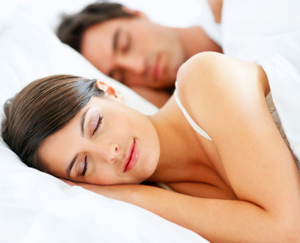Penn Herb Wellness Guide
Sleep Better with Some Natural Support

- L-tryptophan: You may have noticed eating certain proteins—pork, turkey, chicken, seafood, dairy products, and beans, for example—make you sleepy. Why? They contain L-tryptophan, an amino acid and natural sleep aid. Numerous double-blind human studies have found L-tryptophan supplements helpful for folks with insomnia. Take 1 to 2 grams at bedtime.
- Valerian: It’s not necessarily how many hours you sleep that makes you feel rested—it’s how well you sleep while you’re out. Controlled studies have shown the herb valerian can help you enjoy deeper sleep, so you’ll wake more refreshed. Take 300 to 600 mg of concentrated root extract 30 minutes before bed.
- Melatonin: Darkness triggers melatonin production, the hormone that causes you to feel drowsy. If you don’t keep a regular schedule or suffer from jet lag, reset your biological clock by taking melatonin supplements (0.5 to 3.0 mg) one to two hours before bedtime under medical supervision.
- Hops: If your sleeplessness is of the occasional variety, consider hops—a mild sedative. A double-blind trial found the combo of valerian and hops significantly more effective for insomnia than valerian alone. Take one 500-mg capsule before bed.
For best results, go beyond supplements
- Relax your brain: Falling asleep depends on getting your brain to switch out of the stressed-out alpha mode and into a relaxed beta state, so nix the TV and internet before bed and take some time to do deep breathing and dwell on soothing subjects.
- Get poked and prodded: In a preliminary trial, daily treatments of acupuncture—the insertion of fine needles at specific meridian points on the body—eliminated insomnia in a whopping 59% of patients.
- Ditch the stimulants: You’ve probably already heard the drill about quitting your coffee habit. But other stimulants—like MSG, alcohol, cola, and chocolate—are less obvious sleep nabbers. Cut down or eliminate altogether.
- Embrace the dark: Signal to your body that it’s nighttime by using black-out curtains in the bedroom to block out all city light. Eliminate all inside light sources too—including the glow of electric clocks, phones, computers, and so on.
Copyright 2025 TraceGains, Inc. All rights reserved.


